This research stream focuses on the social dynamics of science, technology, and innovation, with particular attention to how technological advancements shape and are shaped by cultural, economic, and societal contexts. It explores the processes through which new technologies emerge, are implemented, and integrated into everyday life, emphasizing their societal impact. This work draws on science and technology studies (STS), media studies, and cultural sociology to examine topics like public engagement with innovation, the role of media in shaping perceptions of science, and the ethical and social implications of technological developments.
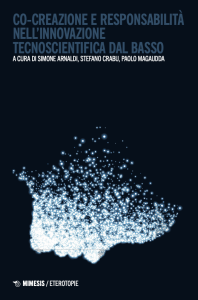 /// 2023 /// Co-creazione e responsabilità nell’innovazione tecnoscientifica dal basso /// Meltemi /// With S. Arnaldi and S. Crabu /// 2023 /// Co-creazione e responsabilità nell’innovazione tecnoscientifica dal basso /// Meltemi /// With S. Arnaldi and S. Crabu
The book explores how scientific and technological innovation is increasingly shaped by the active involvement of civil society groups and associations. and how public participation in science and technology can align innovation with social needs, rather than just market demands. Through case studies in medicine, digital technologies, and environmental sustainability, the book highlights the crucial role citizens play in fostering ethically responsible and socially desirable technoscientific developments. |
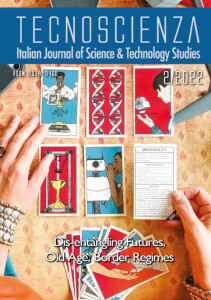 /// 2022 /// Disentangling Futures from a Science and Technology Studies Perspective /// “Tecnoscienza: italian Journal of Science and Technology Studies /// with S. Crabu..At the end of 2022 i co-edited with my colleague Stefano Crabu a special section of the journal Tecnoscienza on the approaches to the study of the relationship between innovation and the future with a STS perspective, including articles by Barbara Prainsack, Marc Audétat, Philippe Sormani and Silvia Casini...... /// 2022 /// Disentangling Futures from a Science and Technology Studies Perspective /// “Tecnoscienza: italian Journal of Science and Technology Studies /// with S. Crabu..At the end of 2022 i co-edited with my colleague Stefano Crabu a special section of the journal Tecnoscienza on the approaches to the study of the relationship between innovation and the future with a STS perspective, including articles by Barbara Prainsack, Marc Audétat, Philippe Sormani and Silvia Casini...... |
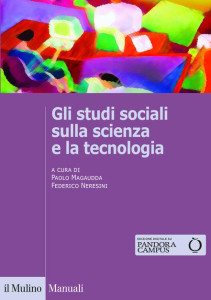 /// 2020 ///Gli studi sociali sulla scienza e la tecnologia /// Il Mulino /// edited with with Federico Neresini. /// 2020 ///Gli studi sociali sulla scienza e la tecnologia /// Il Mulino /// edited with with Federico Neresini.
This handbook, in italian, offers a comprehensive introduction to Science and Technology Studies (STS). It covers key theoretical approaches, including the Social Construction of Technology (SCOT) and Actor-Network Theory (ANT), and addresses topics such as laboratory studies, public engagement, and the role of gender in technoscience. Through interdisciplinary perspectives, the book provides essential insights into the complex interplay between science, technology, and society from a STS perspective. |
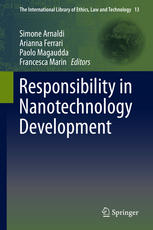 /// 2014 /// Responsibility in Nanotechnology Development /// Springer /// edited with with Simone Arnaldi, Arianna Ferrari and Francesca Marin /// 2014 /// Responsibility in Nanotechnology Development /// Springer /// edited with with Simone Arnaldi, Arianna Ferrari and Francesca Marin
This book disentangles the complex meanings of responsibility in nanotechnology development by focusing on its theoretical and empirical dimensions. The notion of responsibility is extremely diversified in the public discourse of nanoscale technologies. Addressed are major disciplinary perspectives working on nanotechnology, e.g. philosophy, sociology, and political science, as well as the major multidisciplinary areas relevant to the innovation process, e.g. technology assessment and ethics. Furthermore, the interplay between such expertises, disciplines, and research programmes in providing a multidisciplinary understanding of responsibility is emphasized. |
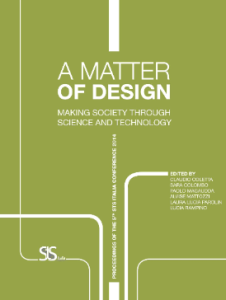 /// 2014 /// A Matter of Design /// STS Italia A huge volume containing about 80 papers from the V STS Italia Conference, which I have co-organized in Milan in 2014. It is a open access publication and is the first book output by STS Italia Publishing. /// 2014 /// A Matter of Design /// STS Italia A huge volume containing about 80 papers from the V STS Italia Conference, which I have co-organized in Milan in 2014. It is a open access publication and is the first book output by STS Italia Publishing. |
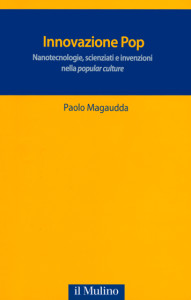 /// 2012 /// Innovazione Pop. Nanotecnologie, scienziati e invenzioni nella popular culture /// Il Mulino /// 2012 /// Innovazione Pop. Nanotecnologie, scienziati e invenzioni nella popular culture /// Il Mulino
The book explores the interplay between science, technology, and popular culture, examining how science fiction and media representations influence public perceptions of science and even the work of scientists themselves. Through case studies on nanotechnology in cinema, science in advertising, and the marketing of Apple technologies, the book illustrates how popular narratives shape and are shaped by scientific innovation, highlighting the cultural dimensions of technoscience. |
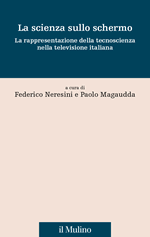 /// 2011 ///La scienza sullo schermo. La rappresentazione della tecnoscienza nella televisione italiana /// Il Mulino /// edited with Federico Neresini /// 2011 ///La scienza sullo schermo. La rappresentazione della tecnoscienza nella televisione italiana /// Il Mulino /// edited with Federico Neresini
This book presents the results of over three years of research by the PaSTIS group at the University of Padova, investigating how different television formats in Italy portray, use, and represent science and technology. From news broadcasts to talk shows and science programs, it analyzes the growing media presence of scientists, experts, and controversies. Combining extensive data with diverse analytical approaches, the book offers a comprehensive view of technoscience on Italian television. |